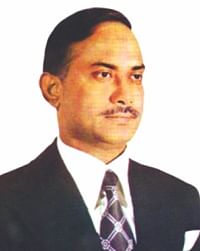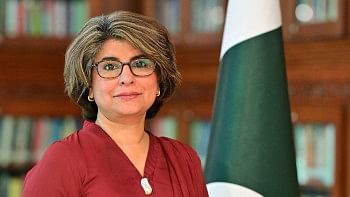Anomalies in court martial
President Ziaur Rahman was assassinated by some army officers on May 30, 1981, in Chittagong. In the aftermath, over a dozen officers were either hanged through a stage-managed trial or just killed. Many freedom-fighter officers were forced into retirement. While the Zia killing trial is yet to begin, the conspiracy behind the assassination remains to be unearthed.
 The defence ministry and army headquarters in their joint move in 2000 had detected various anomalies in the general court martial proceedings against some army officers allegedly involved in the assassination of president Ziaur Rahman in Chittagong.
The defence ministry and army headquarters in their joint move in 2000 had detected various anomalies in the general court martial proceedings against some army officers allegedly involved in the assassination of president Ziaur Rahman in Chittagong.
They informed the parliamentary standing committee on the defence ministry of the findings at a meeting on October 2, 2000, at the Jatiya Sangsad Bhaban.
On receiving the findings, a sub-committee formed by the parliamentary body sought to gain access to the records of the proceedings for further examination. Initially, the government, then led by the Awami League, agreed to meet the sub-committee's demand. But later it changed its mind.
The then defence secretary, M Idris Ali, informed the parliamentary body about their findings and the government's decision as well.
He told the committee that the army discipline would be affected if the proceedings were made available to the parliamentary body, as those were never made public. Even, no discussion was held in parliament on the proceedings.
"Therefore, the government has again decided not to disclose [the records of] the proceedings," said the defence secretary, explaining the government's position.
He, however, did not specify the anomalies in the court martial proceedings.
The defence secretary also requested the chairman and members of the committee to accept the government decision what he said in the "highest interest" of the country.
Yet, the parliamentary body suggested scrapping the court martial proceedings as it was informed that there were anomalies in the proceedings. But the defence ministry paid no heed to the recommendation. The then Prime Minister Sheikh Hasina herself held the defence portfolio.
"We could not proceed further with the issue due to various limitations," Maj Gen (retd) KM Shafiullah, the then chairman of the parliamentary body, told The Daily Star recently.
Shafiullah, also an ex-army chief, would not elaborate on the "limitations" that halted their move.
The trial of the accused army officers in the court martial in July 1981 triggered widespread controversies as it was held violating the army rules. In addition, some innocent officers were convicted of the murder.
No accused person was given the opportunity to raise any objection against any member of the court, should anyone feel he would not get justice. Several other provisions of the army rules were violated.
Agitations took place around the country for such gross violation of the army rules. Victims sought intervention of the Supreme Court after the delivery of the verdict by the court martial. But the SC could not interfere because of the constitutional bar on it.
The army headquarters hurriedly formed the general court martial led by Maj Gen Mohammad Abdur Rahman, an officer repatriated from Pakistan after the country's Liberation War. The hearing started on July 10 and ended on July 26, before the judicial inquiry commission formed by the government completed its inquiry.
In the trial, the first court martial ordered death penalty for 12 officers and different terms in jail for 14 others. The remaining defendants were acquitted but they were dismissed from service.
Later, a second court martial was formed to try another officer who was ill during the trial proceedings in the first court martial. This officer, too, was given death sentence.
The camera trial held General Manzur, who was murdered in army custody inside of the Chittagong cantonment on June 1, 1981, responsible for leading the failed rebellion.
Those awarded the death penalty were hanged in September 1981, three months after Zia was assassinated.
Before the court martial began, the army headquarters hastily carried out a stage-managed inquiry. Maj Gen Mozammel Hossain, who too was repatriated from Pakistan after the 1971 war, led the investigation.
Some accused in the Gen Abul Manzur murder case described how the inquiry was a farce. The court of inquiry, however, recommended holding a court martial of 35 officers and two junior commissioned officers. Most of them were freedom fighters.
The then army chief Gen HM Ershad and officers close to him played a hyperactive role in completing the court martial quickly in a pre-planned way to punish the accused.
After around two decades, the parliamentary body in 2000 moved to review the court martial proceedings to see if it was possible to relieve some of the pain of the victims' families, at least by scrapping the proceedings.
The committee received applications from victims' families seeking remedy. The House committee then formed the sub-committee to deal with the applications.
At one stage, the defence ministry moved to review the court martial proceedings with the army headquarters.
At the October 2 meeting of the parliamentary committee, the then army chief Lt Gen Mostafizur Rahman said proceedings of relevant court martial are confirmed or reviewed by the chiefs of the services under the authorities vested in them.
"If the sub-committee thinks it appropriate to review the trial held in the court martial, it can summon the then army chief HM Ershad to determine if he had taken the correct decision on the trial," Gen Mostafiz told the meeting.
He, however, said discussion was being held on the death penalty awarded to the 12 army officers in 1981.
"Around 400 to 500 army personnel were hanged between 1975 and 1977. All those incidents should be reviewed," he said.
Mostafiz also said military laws in Bangladesh, India and Pakistan were similar. "In India, the court martial proceedings are being reviewed recently through forming law commissions. If needed, such law commissions may be formed in Bangladesh to review the court martial proceedings against armed forces' officers for violation of discipline."
AL lawmaker and committee member Col (retd) Shawkat Ali said the government or the army chief or an authorised army officer could scrap the court martial proceeding under section 132 of the army act.
"In this case, this should be done. Because, the trial was not fair and laws were violated," Shawkat told the meeting.
Members of the committee present at the meeting supported Shawkat.
But there was no further progress to this effect.
[The report has been prepared based on the proceedings of the parliamentary standing committee on the defence ministry in seventh parliament and the books, "Democracy and the Challenge of Development" by Moudud Ahmed, "Silent Witness of a General" by Maj Gen (retd) Moinul Hossain Chowdhury.]

 For all latest news, follow The Daily Star's Google News channel.
For all latest news, follow The Daily Star's Google News channel. 



Comments